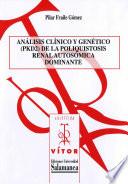Análisis clínico y genético (PKD2) de la poliquistosis renal autosómica dominante
Resumen del Ebook

Autosomal dominant polycystic kidney disease is a multiorganic hereditary disorder. It is responsible for 7-10 % of cases of end stage renal failure. It is caused by mutations in the genes PKD1 and PKD2. Both polycystic kidney disease’s forms have a pathogeny and similar clinic, but in the patients with mutation in PKD2, the clinical manifestations appear later and the progression to end stage renal failure happens 10 years later than in the patients with mutation in PKD1. The diagnosis of this disease can be performed through ultrasounds, but the molecular diagnosis offers some advantages, such as the early detection of asymptomatic individuals who carry this genetic defect, in order to perform a preventive monitoring and genetic counselling. In this work, we present the results of the clinical analysis of 48 patients and the results of the mutational analysis of the PKD2 gene in 18 patients diagnosed with autosomal dominant polycystic kidney disease. The objectives of this work were to analyze the main clinical aspects of the disease as well as analyze the profitability of the genetic study compared with the radiologic study, and perform an early genetic diagnosis in the descendants of patients who were affected by a mutation in the PKD2 gene, trying to establish a correlation between phenotype and genotype. The average age of appearance of the first symptoms was 41.17 ± 13.41 years in women and 49.91 ± 12.52 years in men (p 0.05). Arterial hypertension was the first sign of the disease (68.42 %), with more cases in men than in women (p 0.05), followed by chronic renal failure (68.29 %). The most common renal symptom during the evolution of the disease was chronic renal failure, which was present in all the patients of the study, followed by proteinuria (92.31 %), end-stage renal failure (89.58 %) and arterial hypertension (87.23 %). After the genetic analysis, only one family was diagnosed with a mutation in exon 13 of the PKD2 gene (5.56 %), which consists on a substitution of the nucleotide adenosine by cytosine (c.2398AC), which implies that the amino acid methionine is replaced by leucine (p.800MetLeu). In our population, contrary to what was published in the literature, the mutation of the gene was clinically significant and did segregate with the disease. All the members with a clinical and ultrasound diagnosis of polycystic renal disease presented the above mentioned mutation.
Ficha del Libro
Total de páginas 213
Autor:
- GarcÍa Riaza, Blanca
Categoría:
Formatos Disponibles:
MOBI, PDF, EPUB, AZW
¿Cómo obtener el libro?
A continuación te mostramos varias formas de obtener el libro. Intenta comprartelo en una librería de tu zona, pero sino lo encuentras, nosotros podemos ofrecertelo:
Puntuación
4.9
68 Valoraciones Totales







